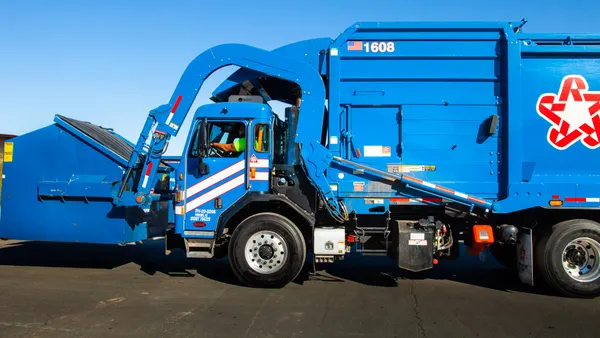Dive Brief:
- Tech Dump, a nonprofit electronics recycler based in Minnesota, has processed over 20 million pounds of e-waste since launching in 2011, according to the company. The group is projected to bring in revenue of $3.3 million this year.
- The nonprofit makes a point to provide job training to adults "facing barriers" to employment so that individuals can find better careers in the future. CEO Amanda LaGrange told Waste Dive that those 20 million pounds represent over 327,000 hours of job training.
- About half of Tech Dump's business comes from refurbishment for resale and the other half from disassembly for the sale of component parts. LaGrange said that Tech Dump is also working on a recovery service, so that customers who want to recycle their phone but may be concerned about losing photos, for example, have an easy way of saving and then securely erasing their data.
Dive Insight:
Tech Dump's milestone shows a steadily growing operation that's been in business since 2011. Since the nonprofit started, Tech Dump has been employing dozens of adults who may have faced barriers to employment — such as those that were formerly incarcerated or dealing with addiction. According to Tech Dump, the nonprofit has become Minnesota's third-largest e-waste collector by volume and graduated 28 adults into stable careers. Like other similar operations in the electronics sector, Tech Dump's success shows that businesses can be successful with employees who might not be traditionally recruited, targeted or hired.
One of the trickier aspects of dealing with e-waste is that the stream is constantly evolving and changing. As tech trends develop and change, consumers are throwing out different types of material and, in some cases, going through devices at a quicker pace than used to be the norm. LaGrange said, for example, that she's seeing an increase in the volume of flat-panel TVs coming in for recycling. "They're not built to last like the old CRTs are," she said. Additionally, she said that Tech Dump is seeing fewer desktop computers and more laptops. There are also some issues, she said, that the industry isn't properly preparing for.
"I don't think that we're talking enough about the internet of things and the role of wearables," she said. "What will we do as an industry when we start seeing Fitbits show up in the tons? There's a battery inside, who's equipped to handle that?"
Tech Dump's split between reselling electronics and breaking devices down into parts highlights the ongoing discussion about the right to repair. According to the environmental advocacy group Greenpeace, a handful of tech companies "contribute" the most to e-waste. Some of the most well-known, high-volume companies also received low ratings in terms of recyclability. Devices that are more difficult to repair — say if they have batteries that are secured with glue, or no repair manuals available — make refurbishment less likely and efficient dismantlement much harder for recyclers. This often leads to shredding for raw materials or outright landiflling. While public pressure could lead some companies to include repair manuals or sell replacement parts, it is likely that state or federal policy action will be necessary to create a change large enough to stem the growing, international tide of e-waste.








